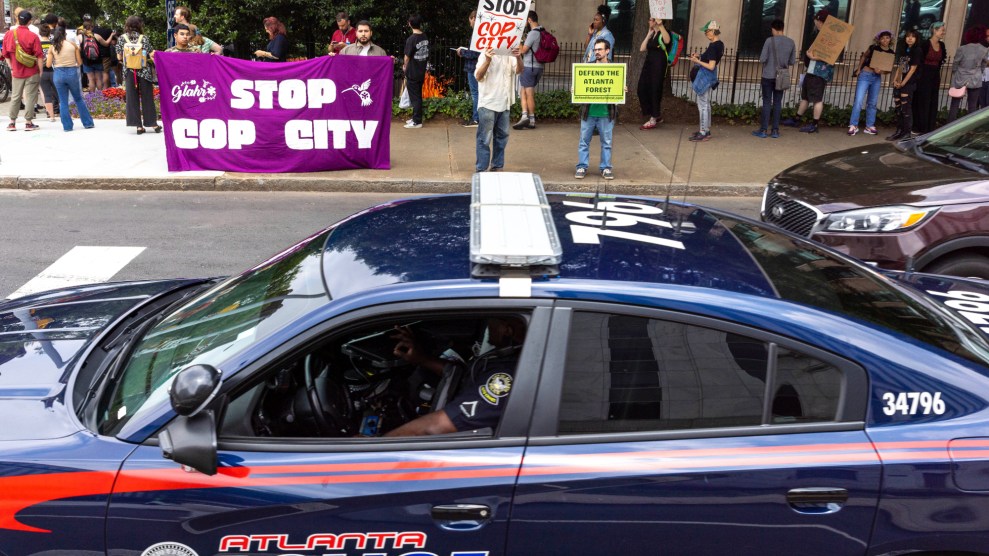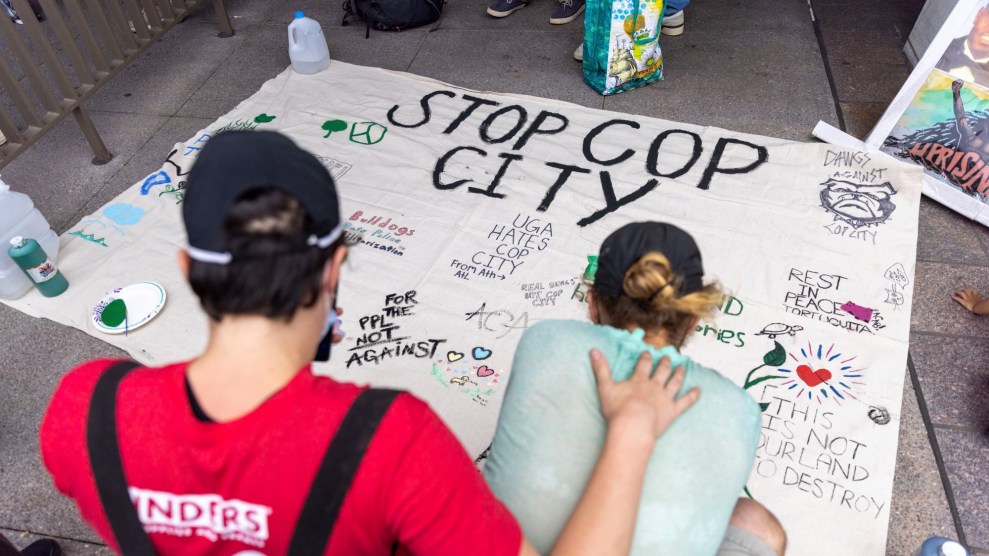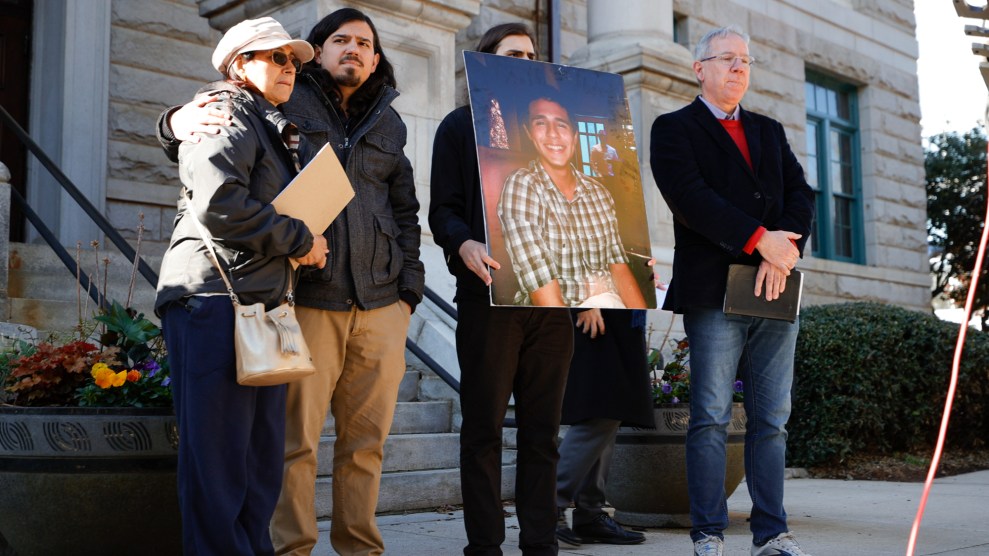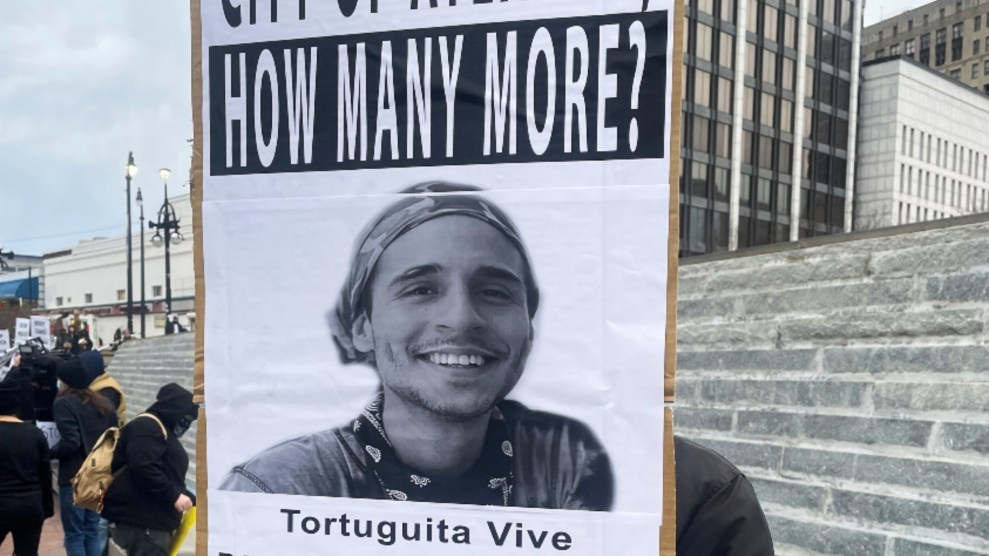
Protesters gather outside Atlanta City Hall ahead of a council vote over whether to approve public funding for the construction of "Cop City," a proposed police and firefighter training center.Arvin Temkar/AP
On Wednesday, an Atlanta city clerk approved a referendum petition from opponents of the Public Safety Training Center—now perhaps better known as “Cop City”—which is slated to be built on 100 acres of forest in a neighboring part of DeKalb county. If organizers are able to get roughly 75,000 signatures in the next 58 days, Atlantans will have the opportunity to vote on whether to cancel the lease of the city-owned land for the project. If that referendum passes, activists will have successfully stopped Cop City.
The effort was announced the day after the Atlanta City Council voted 11-4 to approve $31 million in public funding for the center, following a marathon meeting that featured more than 13 hours of testimony from hundreds of protesters and lasted through the night until 5:30 in the morning. The actual price will be even higher. Because of a “leaseback agreement,” the city will pay the Atlanta Police Foundation—the group that would maintain the facility—$1.2 million a year for the next 30 years, putting the total public cost closer to $67 million. The rest of the money, another $60 million, will come from the APF, a non-profit organization that lobbies on behalf of the police department.
Those in favor of the project—a bipartisan coalition that includes Republican Gov. Brian Kemp, as well as a majority of Atlanta’s Democratic-leaning city council and its Democratic mayor, Andre Dickens—say that current police training facilities are substandard and that Cop City is needed to boost police retention and morale. The ideologically diverse coalition that has formed in opposition argues that the center will further militarize the police and destroy a forest that has been called one of the four “lungs” of Atlanta in official city documents.
To say that opponents of the project have been the subject of repression would be an understatement. In January, Georgia State Patrol shot and killed a protester named Manuel Esteban Paez Terán in a hail of bullets during a raid on the forest where activists had been camped out for months attempting to block construction. The Georgia Bureau of Investigation said that Teran shot at officers first, but as I wrote in April, the autopsy undermined that claim. Since then, according to the Guardian, 42 people protesting against Cop City have been arrested and charged with domestic terrorism. Some were charged with terrorism for destroying police and construction vehicles, others for merely appearing to associate with the Defend The Atlanta Forest movement.
In May, three activists were charged with felony intimidation of an officer of the state for posting fliers that called a cop who participated in the January raid a “murderer.” Earlier this month, at least a dozen officers in SWAT gear raided a house in Atlanta that was a well known local organizing hub. They arrested three activists connected to the Atlanta Solidarity Fund, an organization that has paid protesters’ legal expenses. These activists were charged with charity fraud and money laundering—allegations they vehemently deny.
The Cop City referendum was modeled on a similar, successful effort undertaken in Camden County, Georgia, to stop the construction of a proposed rocket launch site. That referendum, which passed overwhelming, was upheld by the Georgia Supreme Court. According to the Cop City journalistic watchdog group ATL Press Collective, organizers have 60 days to collect the required signatures—but they only have 58 days to do so if they hope to place it on the November 7 ballot. If they miss that deadline, the referendum could appear on the ballot in March. Paul Glaze, an organizer with Cop City Vote Coalition, told Atlanta’s 11Alive that more than 3,000 volunteers have signed up to collect signatures.
On June 7, activists announced their campaign plan at a press conference that featured speakers from the NAACP Legal Defense Fund and the Working Families Party. “The people need to have a voice on whether or not there is a cop city. The city council has failed over and over again to listen to the masses of people in Atlanta,” said Kamau Franklin, the founder of the local group Community Movement Builders, who spoke to Mother Jones in February. “We’re not contemplating failure. We’re contemplating what we do when we succeed and when we have to force the city to turn that forest back over to the people, and when we stop the city of Atlanta from militarizing its police to attack our community.”
A central question in the Cop City fight is whether or not most Atlanta residents actually want it built. In February, Mayor Dickens released a poll showing that 61 percent of respondents supported the public safety training facility and 26 percent opposed it. A separate poll in March by professors at Emory University found that just 48 percent supported it, while 46 percent opposed it.
In November, we may finally get an answer.

















